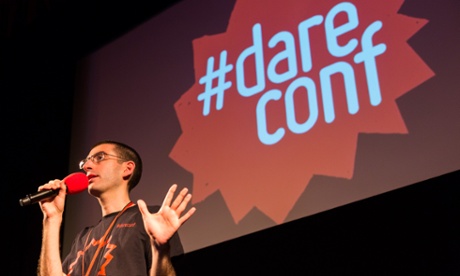
The tech scene is awash with conferences: it seems every other day there’s a new clique of enthusiastic men (and, on occasion, women) pitching up to talk about JavaScript libraries, exciting things going on with SVG images, reasons you should use their Scala framework or ten things they wish you knew about DevOps. It was a refreshing treat, then, to experience #dareconf last week, billing itself as “people skills for digital workers”. A couple of members of the Guardian’s digital development department went along, myself included, to learn more.
The setting at London’s Barbican was already inspiring, with its mix of concrete brutalism contrasting with the indoor jungle. Around a hundred attendees gradually filed into one of the cinema-style auditoriums and the two day event began.
The theme of the conference could be inferred from the talk titles: “Free yourself from perfectionism”; “How to stop being an expert”; “How to commit to change”. Each of the eleven speakers had embarked on a twenty week talk development programme which was clearly reflected in their quality: each followed a “hero’s journey” story arc, which saw almost all speakers revisit painful memories or embarrassing failures in their quest to impart something powerful and inspiring to the audience.
A standout for me during the first day was Samiya Parvez’s “Redefine yourself”. This talk was tinged with tragedy as she related the death of her disabled son and her sense that all the skills she’d learned in caring for him had suddenly become redundant. Her gradual transformation into an entrepreneur building 3D-printed parts for wheelchairs and more was a fascinating and heartening tale. Far from being an X-Factor-esque mawkfest, it left me with a sense of the DIY ethics that Caroline Moore also referred to in her “Deconstructing your excuses” talk earlier that day.
Another standout was Samantha Soma’s day two opener, “How to stop rescuing people”. She related the times in her life she’d felt motivated to “rescue” others, and the resulting impact this had on her (and their sense of ownership of their problems). While talking about the death of her mother she showed a slide of the oxygen mask warning on flights – eg. to ensure you have proper oxygen flow before helping others with their masks. She didn’t have to force the analogy for the point to be made around avoiding burnout and stress, key issues with digital workers.
In between talks on both days were interactive group sessions on collaboration, listening and mindfulness. These sessions were both brilliantly scheduled, bookending talks neatly, but also valuable and invigorating. An exercise in Nonviolent Communication had me re-interpret a recent difficult interaction with a colleague in a completely different way, giving my group and I a literal “a-ha moment” as we realised a possible cause, and myself a moment of pause as I reflected on my own actions.
Reflection was a key theme of #dareconf – after each talk there was a ten minute break while we filled in our “passport”: the guidebook for the event, which had a series of key questions paired with each talk. After a speaker left the stage, music was played softly while we wrote responses to issues raised by the talk. At other events this may have seemed trite or distracting, but given the content and setting it felt really crucial to getting the most out of the event: at other conferences I’m known to sit with one eye on the Twitter backchannel, wondering what other listeners thought were the quotable one-liners worth tweeting. At #dareconf I eschewed any digital devices while talks were in session, taking occasional notes and waiting till the end to gather my thoughts.
By the end of the two days I felt quite exhausted: the amount of interesting, emotional and challenging talks and ideas we’d heard shared was staggering. Many of the speakers had got on stage to tell difficult, personal stories: one man told about how his agency was inadvertently caught passing off copyrighted work as their own. Another talked candidly about the breakup of her marriage. But this wasn’t a melodramatic affair: these were people being honest and realistic. Too often at technical conferences we hear bold success stories without any of the ugly truths underlying them, or when we do hear about failure and errors they’re funny, throwaway mistakes. The refreshing sense that #dareconf’s speakers weren’t superheroic geniuses, who in fact suffered from the same issues and problems the rest of us do, was really important and valuable.
The lineup, too, deserves special mention. A diverse mix of speakers (including a 74 year old woman whose wonderful talk was titled “Life is long: find happiness now”) meant we avoided another classic tech conference cliche of watching a dozen identikit developers get up and give the same sort of talk.
The mood of attendees as the event closed was contemplative: many people I spoke to talked about their need for time to digest and absorb everything they’d heard, and everybody praised the honesty and bravery of the speakers for sharing what they did. For me, I thought the response of one audience member at the start summed up what I got out of #dareconf 2014: the chance to luxuriously think and reflect on things – myself, my career, the way we work – for two whole days. If you get the chance, you should go to the next #dareconf (or help them take it to the USA) and challenge yourself, too.
You can watch videos of the #dareconf 2014 talks on the official website here.
All photos © paulclarke.com

